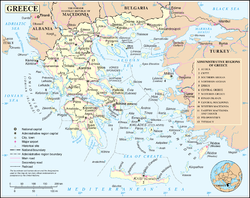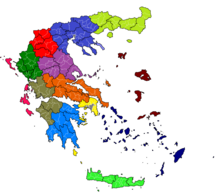| Regions of Greece Περιφέρειες της Ελλάδας (Greek) | |
|---|---|
 | |
| Category | Unitary state |
| Location | Hellenic Republic |
| Number | 13 Regions 1 Autonomous Region |
| Populations | 197,810 (North Aegean) – 3,812,330 (Attica) |
| Areas | 2,307 km (891 sq mi) (Ionian Islands) – 18,810 km (7,260 sq mi) (Central Macedonia) |
| Government |
|
| Subdivisions | |
| This article is part of a series on |
| Politics of Greece |
|---|
 |
| Constitution |
Executive
|
| Legislature |
Judiciary
|
| Subdivisions |
Elections
|
Foreign relations
|
| Part of a series on the |
| Subdivisions of Greece |
|---|
 |
| First level |
| Second level |
| Third level |
|
| Autonomous Region |
| Obsolete terms |
|
51 Prefectural Administrations Prefectural Department, 2 Hyper-Prefectures 148 Provinces Municipal/Communal/Local Department |
The regions of Greece (Greek: περιφέρειες, romanized: periféreies) are the country's thirteen second-level administrative entities, counting decentralized administrations of Greece as first-level. Regions are divided into regional units, known as prefectures until 2011.
History
The current regions were established in July 1986 (the presidential decree officially establishing them was signed in 1987), by decision of the interior minister, Menios Koutsogiorgas, as second-level administrative entities, complementing the prefectures (Law 1622/1986). Before 1986, there was a traditional division into broad historical–geographical regions (γεωγραφικά διαμερίσματα), which, however, was often arbitrary; not all of the pre-1986 traditional historical-geographic regions had official administrative bodies. Although the post-1986 regions were mostly based on the earlier divisions, they are usually smaller and, in a few cases, do not overlap with the traditional definitions: for instance, the region of Western Greece, which had no previous analogue, comprises territory belonging to the Peloponnese peninsula and the traditional region of Central Greece.
As part of a decentralization process inspired by Interior Minister Alekos Papadopoulos, they were accorded more powers in the 1997 Kapodistrias reform of local and regional government. They were transformed into fully separate entities by the 2010 Kallikratis Plan (Law 3852/2010), which entered into effect on 1 January 2011. In the 2011 changes, the government-appointed general secretary (γενικός γραμματέας) was replaced with a popularly elected regional governor (περιφερειάρχης) and a regional council (περιφερειακό συμβούλιο) with five-year terms. Many powers of the prefectures, which were also abolished or reformed into regional units, were transferred to the region level. The regional organs of the central government were in turn replaced by seven decentralized administrations, which group from one to three regions under a government-appointed general secretary.
List of regions
| |
| Map showing modern regions of Greece |
Bordering the region of Central Macedonia there is one autonomous region, Mount Athos (Agion Oros, or "Holy Mountain"), an autonomous monastic community under Greek sovereignty. It is located on the easternmost of the three large peninsulas jutting into the Aegean from the Chalkidiki peninsula.
| Region | Seat | Area (km) |
Governor (1 January 2024 – 31 December 2028) | Population (2023) |
Population density (residents/km) |
GDP (million €) |
GDP per capita (€) | ||
|---|---|---|---|---|---|---|---|---|---|
| 1 | Attica | Athens | 3,808 | Nikos Hardalias [el] (ND) |
3,790,842 | 995.49 | 97,030 | 25,596 | |
| 2 | Central Greece | Lamia | 15,549 | Fanis Spanos (ND) |
504,167 | 32.42 | 11,475 | 22,760 | |
| 3 | Central Macedonia | Thessaloniki | 18,811 | Apostolos Tzitzikostas (ND) |
1,782,630 | 94.77 | 28,418 | 15,942 | |
| 4 | Crete | Heraklion | 8,336 | Stavros Arnaoutakis (PASOK–KINAL) |
622,909 | 74.73 | 10,331 | 16,585 | |
| 5 | Eastern Macedonia and Thrace | Komotini | 14,157 | Christodoulos Topsidis [el] (Independent) |
559,730 | 39.54 | 8,117 | 14,502 | |
| 6 | Epirus | Ioannina | 9,203 | Alexandros Kahrimanis [el] (ND) |
318,890 | 34.65 | 4,432 | 13,898 | |
| 7 | Ionian Islands | Corfu | 2,307 | Giannis Trepeklis [el] (Independent) |
202,185 | 87.64 | 3,343 | 16,534 | |
| 8 | North Aegean | Mytilene | 3,836 | Kostas Moutzouris [el] (Independent) |
195,509 | 50.97 | 2,704 | 13,831 | |
| 9 | Peloponnese | Tripoli | 15,490 | Dimitris Ptochos [el] (ND) |
534,345 | 34.50 | 9,729 | 18,207 | |
| 10 | South Aegean | Ermoupoli | 5,286 | George Hatzimarkos [el] (ND) |
326,945 | 61.85 | 6,737 | 20,606 | |
| 11 | Thessaly | Larissa | 14,037 | Dimitris Kouretas [el] (PASOK–KINAL) |
682,189 | 48.60 | 10,661 | 15,628 | |
| 12 | Western Greece | Patras | 11,350 | Nektarios Farmakis [el] (ND) |
643,188 | 56.67 | 9,093 | 14,137 | |
| 13 | Western Macedonia | Kozani | 9,451 | Giorgos Amanatidis [el] (ND) |
250,453 | 26.50 | 4,552 | 18,175 | |
| (14) | Mount Athos | Karyes | 336 | Anastasios Mitsialis | 1,746 | 5.20 | — | — | |
See also
References
- Ν.1622/86 "Τοπική Αυτοδιοίκηση - Περιφερειακή Ανάπτυξη - Δημοκρατικός Προγραμματισμός", (ΦΕΚ 92/τ.Α΄/14-7-1986)
- "Στοιχεία Υπολογιζόμενου Πληθυσμού (1.1.2023)" (in Greek). Hellenic Statistical Authority. 29 December 2023. Retrieved 4 December 2024.
- https://ec.europa.eu/eurostat/databrowser/view/nama_10r_2gdp__custom_14043837/default/table?lang=en
| Regions of Greece | ||
|---|---|---|
| Regions | ||
| Autonomous regions | ||
| Greek terms for administrative divisions | |
|---|---|
| Modern | |
| Defunct | General Admnistration * Prefecture (Super-Prefecture, Prefectural Department) * Province * Municipal Department* Communal Department * Municipal Community * Local Community |
| Historical | |
| First-level administrative divisions in European countries | |
|---|---|
| Sovereign states |
|
| States with limited recognition | |
Table of administrative divisions by country
| |
